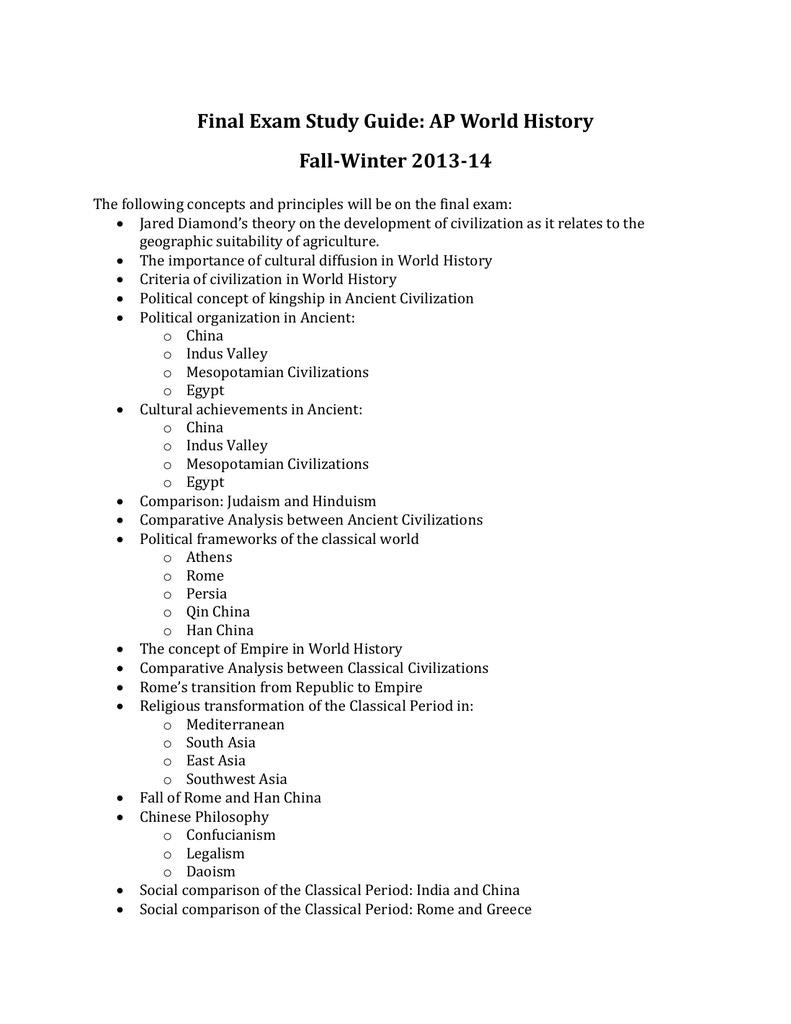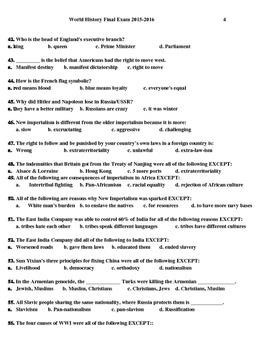world history final exam study guide answer key pdf


World History Final Exam Study Guide⁚ A Comprehensive Approach
Conquer your World History final exam with this comprehensive guide. Master key topics, time periods, and historical figures. Utilize effective study resources like textbooks and online flashcards. Develop strategic exam preparation methods and a practical study schedule. Practice with sample questions and identify common pitfalls to avoid; Seek extra help when needed for exam success.
I. Exam Structure and Format
The World History final exam’s structure and format are crucial to understand for effective preparation. Familiarize yourself with the exam’s overall design, including the types of questions (multiple choice, essay, short answer, etc.) and their respective weightings. Knowing the point allocation for each section allows you to prioritize your study time accordingly. Check your syllabus or consult your instructor for specific details on the exam’s format. Understanding the time constraints is also vital for effective time management during the exam. Allocate appropriate time for each section based on its point value and difficulty. Practice completing sample exams under timed conditions to simulate the actual exam environment. This will help you gauge your pacing and identify areas where you might need to improve your speed and efficiency.
II. Key Topics and Time Periods Covered
Thoroughly review the key topics and time periods encompassed in your World History course. Your syllabus and course materials will provide a detailed outline of the subjects covered. Focus on the major historical events, significant figures, and pivotal turning points within each period. Pay close attention to the connections and interactions between different regions and civilizations across time. Create a chronological timeline to visualize the historical flow and identify key relationships between events. Use this timeline to highlight significant developments and their impact on subsequent eras. Remember that understanding the broader context of events is as important as memorizing specific details. Organize your notes by thematic categories to facilitate efficient recall and comprehension. This structured approach will enable you to grasp the intricate relationships between various historical topics.
III. Essential Historical Figures and Events
This section focuses on identifying and understanding the significance of key historical figures and events. For each individual or event, delve into their impact on the course of history, exploring their contributions, consequences, and lasting legacies. Focus not only on memorizing names and dates but also on grasping the underlying causes, consequences, and broader significance of these events. Analyze the interplay between individuals and societal changes, noting how specific actions or decisions shaped the trajectory of history. Consider creating flashcards or concept maps to enhance your understanding and recall. Connect these figures and events to the broader themes and periods covered in the course. Understanding the context in which they occurred is crucial for a comprehensive understanding. Don’t just memorize facts; strive to comprehend their interrelationships and long-term implications.
IV. Utilizing Study Resources Effectively
Effective utilization of study resources is paramount for success. Your textbook remains a cornerstone, providing detailed information and context. Focus on key chapters and sections highlighted in your syllabus or study guide. Don’t just passively read; actively engage with the material. Take notes, summarize key concepts, and create outlines. Supplement your textbook with online resources. Quizlet and other flashcard apps offer interactive tools for memorizing key terms, dates, and figures. Explore online encyclopedias and reputable historical websites for supplementary information and diverse perspectives. Consider forming study groups to discuss challenging topics and share insights. Collaboration can enhance understanding and identify knowledge gaps. Remember, effective studying is not just about quantity but quality. Prioritize understanding over rote memorization. Focus on grasping the bigger picture and the connections between different historical events and figures.
A. Textbook Chapters and Sections
B. Online Quizlets and Flashcards
Leverage the power of online resources like Quizlet and other flashcard platforms to enhance your study efforts. These tools offer pre-made flashcards covering various historical periods and topics, allowing you to efficiently review key terms, events, and figures. Many sets are created by students and educators, offering diverse perspectives and explanations. Don’t just passively read the flashcards; actively test your recall by covering the answers and trying to remember the definitions. For optimal learning, create your own flashcards focusing on areas where you struggle. This active recall strengthens memory and helps pinpoint knowledge gaps. Consider using spaced repetition techniques, reviewing flashcards at increasing intervals to improve long-term retention. Organize your flashcards into thematic sets to improve comprehension by identifying connections between concepts. Supplement your flashcards with additional notes or diagrams to enhance understanding. Utilize Quizlet’s testing features to simulate the exam environment and assess your progress. Remember, online flashcards are a valuable tool, but they shouldn’t be your sole study method. Integrate them with textbook reading, note-taking, and other study techniques for a comprehensive approach.
V. Strategies for Effective Exam Preparation
Effective exam preparation goes beyond simply rereading notes. Develop a structured study plan, allocating sufficient time for each topic based on its complexity and your understanding. Prioritize areas where you feel less confident, dedicating extra time to mastering challenging concepts. Active recall is crucial; instead of passively reviewing, test yourself regularly using practice questions and flashcards. Explain historical events and concepts in your own words to ensure a deeper understanding; Connect seemingly disparate events and identify overarching themes to improve comprehension and retention. Organize your study materials logically, using mind maps, timelines, or other visual aids to create a clear structure. Seek clarification on any confusing points from your teacher, textbook, or online resources. Regular breaks are essential to avoid burnout. Vary your study methods; switch between reading, writing, and active recall exercises to maintain focus and engagement. Collaborate with classmates; discussing concepts and teaching each other can reinforce learning and identify areas needing further attention. Practice past exam papers or sample questions to familiarize yourself with the exam format and question types. Don’t cram the night before; consistent, well-paced study throughout the period is far more effective. Ensure adequate sleep, nutrition, and hydration for optimal cognitive function on exam day.
VI. Time Management and Study Schedule
Effective time management is paramount for successful exam preparation. Begin by creating a realistic study schedule, breaking down the available time into manageable study sessions. Allocate specific time slots for each topic, considering its weight and your personal strengths and weaknesses. Prioritize the most challenging or heavily weighted topics, ensuring sufficient time for thorough review and practice. A detailed schedule prevents last-minute cramming and allows for focused, productive study. Include regular breaks in your schedule to avoid burnout and maintain concentration. Short, frequent breaks are more effective than long, infrequent ones. Use a timer to track your study sessions and ensure you stay on track. Regularly review your progress and make adjustments to your schedule as needed. Consider using time-blocking techniques, assigning specific tasks to particular time slots. Prioritize tasks based on urgency and importance. Utilize productivity tools such as planners, calendars, or apps to stay organized and manage your time effectively. Remember to factor in time for rest and relaxation; adequate sleep and leisure activities are essential for optimal cognitive function and stress reduction. A well-structured study schedule promotes efficient learning, reduces anxiety, and enhances exam performance.

VII. Practice Exams and Sample Questions
Practice exams are invaluable tools for gauging your understanding and identifying areas needing further attention. Seek out practice exams from your textbook, online resources, or previous years’ exams if available. These provide realistic simulations of the actual exam format and question types, allowing you to familiarize yourself with the style and pacing. Working through practice exams helps reinforce learned concepts and highlights knowledge gaps. Focus on understanding the reasoning behind correct answers, rather than just memorizing them. Analyze your mistakes to pinpoint areas where you need more review. Time yourself while taking practice exams to simulate exam conditions and improve time management skills. This helps to identify any time constraints you might encounter during the actual exam. Consider creating your own practice questions based on your study notes and textbook chapters. This active recall strengthens memory retention. Use practice exams as a diagnostic tool, identifying your weak points and allowing you to focus your study efforts accordingly. Regularly review and analyze your performance on practice exams to track your progress and adjust your study strategy if needed. This iterative process ensures you are efficiently using your study time and maximizing your chances of success.
VIII. Common Mistakes to Avoid
Avoid cramming⁚ Last-minute studying is ineffective and leads to stress and poor performance. Instead, create a study schedule that allows for consistent, spaced-out review. Don’t rely solely on memorization⁚ Understanding historical concepts and their connections is crucial. Rote memorization without comprehension leads to fragile knowledge and difficulty applying information to exam questions. Neglecting practice exams⁚ Practice exams are essential for identifying weaknesses and improving time management. Avoid skipping this crucial step in your preparation. Ignoring diverse study resources⁚ Utilize your textbook, class notes, online resources, and any supplementary materials provided. Relying on a single source limits your understanding and exposes you to potential biases. Poor time management during the exam⁚ Allocate time wisely to each section of the exam, avoiding getting bogged down on difficult questions. Review your answers if time permits. Failing to seek help⁚ Don’t hesitate to ask your instructor, teaching assistant, or classmates for clarification on confusing concepts or areas where you struggle. Procrastination significantly harms your chances of success, so begin your preparation early and consistently.
IX. Seeking Additional Help and Support
Don’t hesitate to utilize all available resources to enhance your understanding and exam preparation. Your instructor is a valuable asset; schedule office hours to clarify confusing concepts or discuss areas where you need extra guidance. Teaching assistants often provide supplemental support and can offer additional explanations or practice problems. Study groups can be incredibly beneficial, fostering collaborative learning and providing different perspectives on the material. Leverage online resources, such as educational websites and forums, to access extra practice questions, quizzes, and explanations. Consider tutoring services if you feel significantly overwhelmed or require more individualized attention. Remember, seeking help is a sign of strength, not weakness, and demonstrates your commitment to academic success. Utilize your school’s learning center or library; these resources provide quiet study spaces and access to reference materials. Remember, proactive engagement with available support systems significantly improves your chances of excelling on your exam.